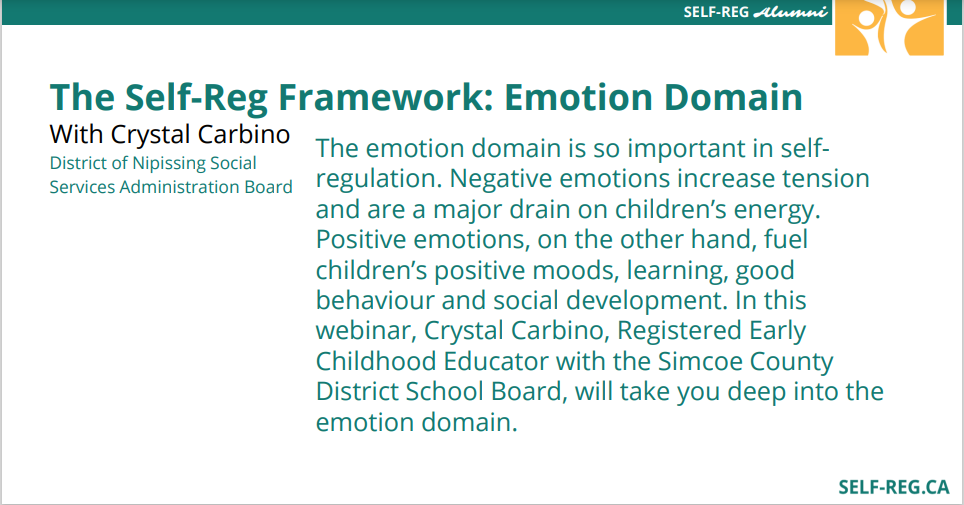
The emotion domain is so important in self-regulation. Negative emotions increase tension and are a major drain on children’s energy. Positive emotions, on the other hand, fuel children’s positive moods, learning, good behaviour and social development.
In this webinar, Crystal Carbino, Registered Early Childhood Educator and Kindergarten Specialist with the Simcoe County District School Board, will take you deep into the emotion domain:
• Hidden stressors in the emotion domain
• How emotional stressors impact and worsen stressors in the other domains
• Why cognitive approaches to emotional stress are so often ineffective
• The role of reframing in recognizing and understanding emotion domain stressors
• What emotionally stressed kids really need from us
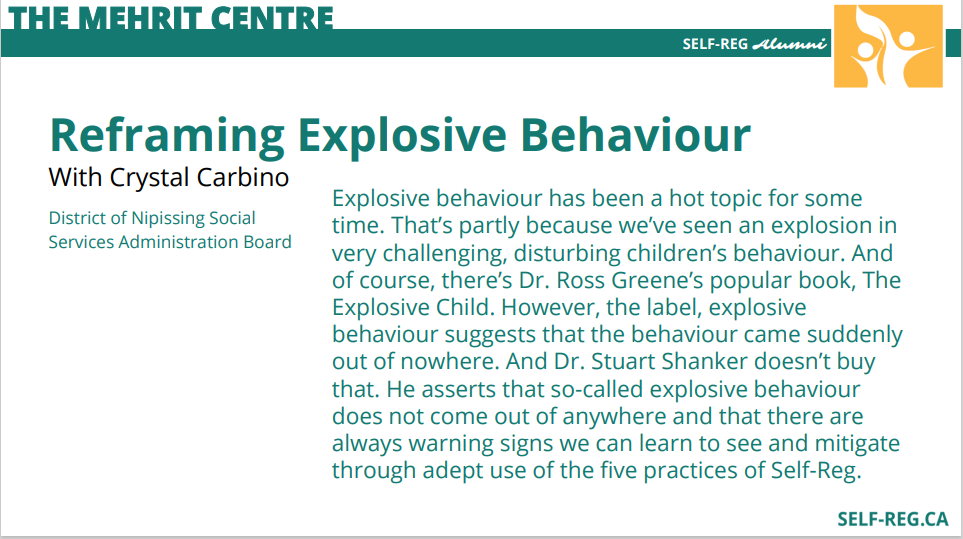
Explosive behaviour has been a hot topic for some time. That’s partly because we’ve seen an explosion in very challenging, disturbing children’s behaviour. And of course, there’s Dr. Ross Greene’s popular book, The Explosive Child. However, the label, explosive behaviour suggests that the behaviour came suddenly out of nowhere. And Dr. Stuart Shanker doesn’t buy that. He asserts that so-called explosive behaviour does not come out of anywhere and that there are always warning signs we can learn to see and mitigate through adept use of the five practices of Self-Reg.
In this webinar, Crystal Carbino, Registered Early Childhood Educator and Kindergarten Specialist with the Simcoe County District School Board, will explore:
• The real cause of explosive behaviour (excess stress)
• Allostatic overload- what it means and how it affects children’s brains and bodies in ways that contribute to behavioural outbursts
• How Self-Reg can help you prevent explosive episodes before they happen
• Less obvious and hidden stressors that cause a buildup in a child’s overall stress load
• The responses children really need during explosive episodes
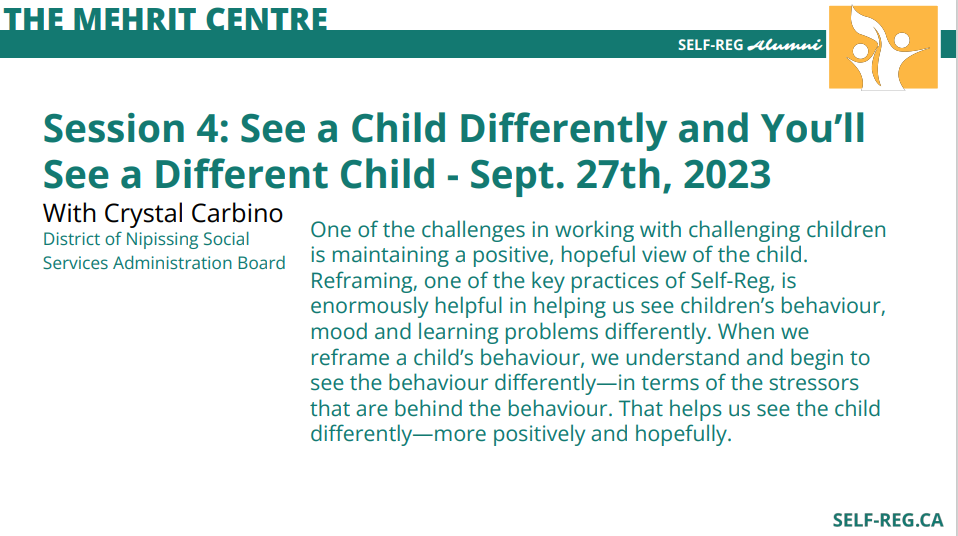
One of the challenges in working with challenging children
is maintaining a positive, hopeful view of the child.
Reframing, one of the key practices of Self-Reg, is
enormously helpful in helping us see children’s behaviour,
mood and learning problems differently. When we
reframe a child’s behaviour, we understand and begin to
see the behaviour differently—in terms of the stressors
that are behind the behaviour. That helps us see the child
differently—more positively and hopefully.
In this webinar, Crystal Carbino, Registered Early Childhood Educator and Kindergarten Specialist with the Simcoe County District School Board, will take you on a deep dive into reframing:
• The inextricable connection between excess stress and troubling behaviour
• How reframing behaviour can reduce our own stress as we deal with challenging behaviour
• How reframing enables us to see a child who is struggling and needs our support, as opposed to a kid who is on a crash course with negative outcomes
• The importance of good relationships with challenging children and how reframing helps.
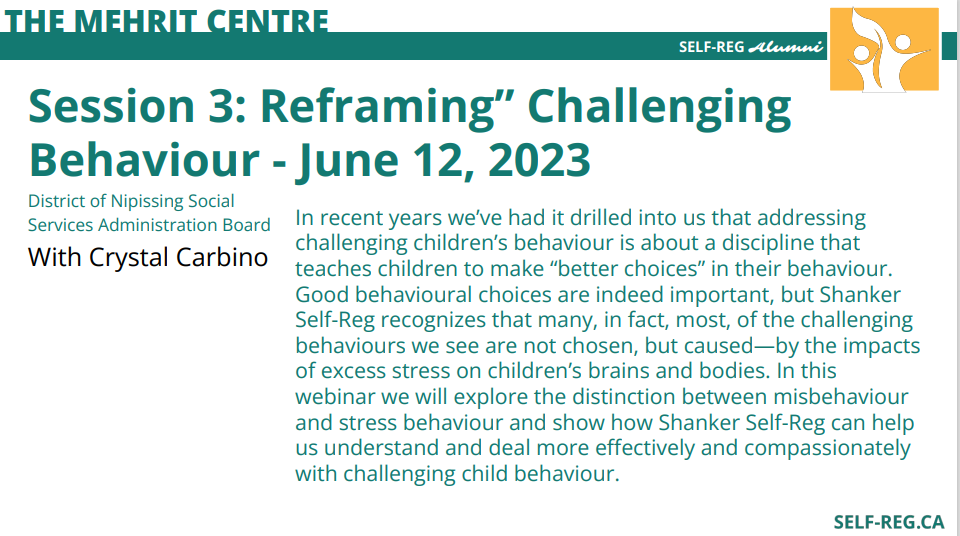
In recent years we’ve had it drilled into us that addressing challenging children’s behaviour is about a discipline that teaches children to make “better choices” in their behaviour. Good behavioural choices are indeed important, but Shanker Self-Reg recognizes that many, in fact, most, of the challenging behaviours we see are not chosen, but caused—by the impacts of excess stress on children’s brains and bodies.
In this webinar, Crystal Carbino, Registered Early Childhood Educator and Kindergarten Specialist with the Simcoe County District School Board, will explore the distinction between misbehaviour and stress behaviour and show how Shanker Self-Reg can help us understand and deal more effectively and compassionately with challenging child behaviour. Talking points will include:
• How children’s brains respond to excess stress the impact of excessive stress on children’s energy, tension and behaviour
• How to distinguish between misbehaviour and stress behaviour
• How Self-Reg can help us understand and respond to stress behaviour more effectively
• How to recognize and reduce hidden stressors that affect the behaviour of many of today’s children
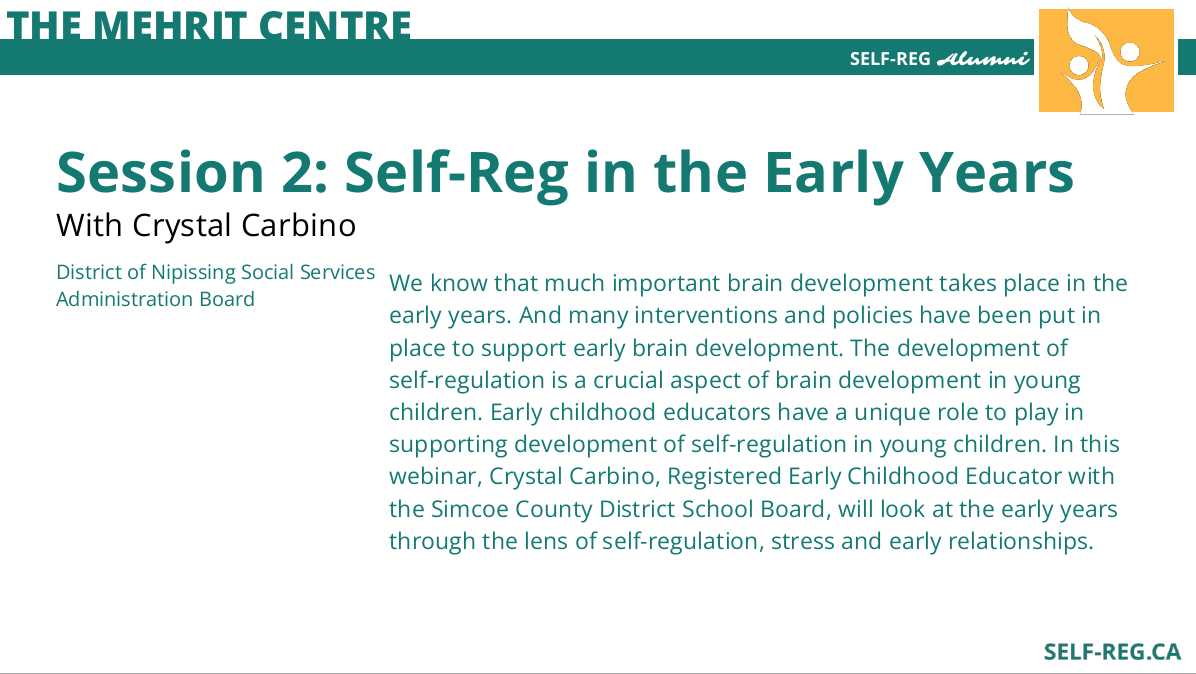
We know that much important brain development takes place in the early years. And many interventions and policies have been put in place to support early brain development. The development of self-regulation is a crucial aspect of brain development in young children. Early childhood educators have a unique role to play in supporting development of self-regulation in young children. In this webinar, Crystal Carbino, Registered Early Childhood Educator and Kindergarten Specialist with the Simcoe County District School Board, will look at the early years through the lens of self-regulation
• The role of relationships in early brain, emotional and social development
• Co-regulation: the foundation for self-regulation
• The Interbrain: nature’s “Bluetooth” hook-up that connects a young child’s brain to an adult caregiver’s brain
• The meaning of safe for babies, toddlers and preschoolers• The stressors (including hidden stressors) that affect young children
• The difference between misbehaviour and stress behaviour
• Self-Reg strategies that reduce young children’s stress and foster healthy relationship
We know that much important brain development takes place in the early years. And many interventions and policies have been put in place to support early brain development. The development of self-regulation is a crucial aspect of brain development in young children. Early childhood educators have a unique role to play in supporting development of self-regulation in young children. In this webinar, Crystal Carbino, Registered Early Childhood Educator and Kindergarten Specialist with the Simcoe County District School Board, will look at the early years through the lens of self-regulation
• The role of relationships in early brain, emotional and social development
• Co-regulation: the foundation for self-regulation
• The Interbrain: nature’s “Bluetooth” hook-up that connects a young child’s brain to an adult caregiver’s brain
• The meaning of safe for babies, toddlers and preschoolers• The stressors (including hidden stressors) that affect young children
• The difference between misbehaviour and stress behaviour
• Self-Reg strategies that reduce young children’s stress and foster healthy relationships
